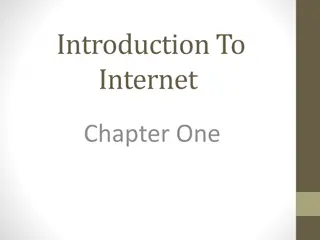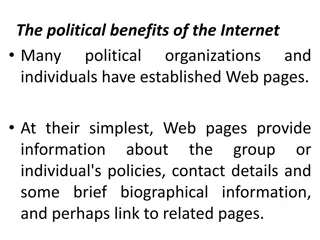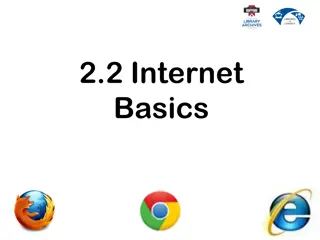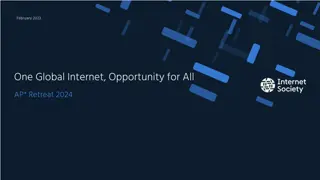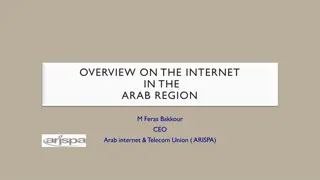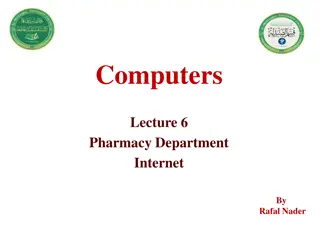Benefits of the Internet: Economic, Social, Political, Educational, Cultural
The Internet brings vast economic benefits by driving digital content creation and innovation, boosting employment, and facilitating global trade. Its social impact includes enabling worldwide communication and economic empowerment. Politically, it fosters information exchange, while educationally and culturally, it enhances access to knowledge and diverse perspectives.
Download Presentation

Please find below an Image/Link to download the presentation.
The content on the website is provided AS IS for your information and personal use only. It may not be sold, licensed, or shared on other websites without obtaining consent from the author. Download presentation by click this link. If you encounter any issues during the download, it is possible that the publisher has removed the file from their server.
E N D
Presentation Transcript
Benefits of the Internet The Economic benefit of the Internet The Social benefit of the Internet The Political benefit of the Internet The Educational benefit of the Internet The Cultural benefit of the Internet
The economic benefits of the Internet The economies of the world are increasingly powered by the creation, use and transmission of information and entertainment content in digital format. The deployment of Internet infrastructure impacts the economy both directly and indirectly. The effects of broadband technology on the economy are much more far-reaching than the direct benefit created by capital investment in deployment and the manufacturing of the components such a network requires.
As Internet penetration increases, there will be resulting demand for computer and home network equipment, wireless devices and other equipment. software applications, Like all infrastructure investment, the economic impacts of Internet will increased productivity and innovation that it fosters. also include the The Internet provides increases in employment and economic activity.
The infrastructure will have the direct effect of employing thousands of people: to manufacture, sell, purchase, install, manage, and maintain the equipment and facilities, as well as the resulting services. wide-ranging deployment of Internet The Internet makes the world smaller. The ability to communicate and instantaneously and across vast distances has enabled more individuals and businesses to participate in the economy, regardless of their location. exchange information
Large companies can connect with employees, suppliers, and partners around the globe, and small businesses can find their customers anywhere in the world. Businesses can hire knowledge workers almost regardless of where they are, greatly expanding employment opportunities for people in the United States, and giving developing nations the ability to become economic powerhouses by providing information technology services to the rest of the world. The Internet, along with other computer technologies, is literally enabling some developing countries to "leapfrog" the industrial revolution and jump straight to the Internet Age.
The Internet makes the world simpler. For businesses, the Internet breaks down logistical barriers, offering greater flexibility and power in the way they do business. It shrinks time and distance, simplifies complex business processes, and enables more effective collaboration--a giant corporation can now be as nimble as a tiny start-up, while a family firm located in a remote rural village now has the world as its marketplace. communication and Combined with advanced productivity software, the Internet enables individual knowledge workers to use their time more efficiently, and to focus on more productive tasks. And it gives consumers the ability to shop smarter, to find the best products at the right prices. In fact, it empowers them in ways that once were available only to large companies, enabling them to join with others to buy products at lower prices, and bid competitively around the world.






